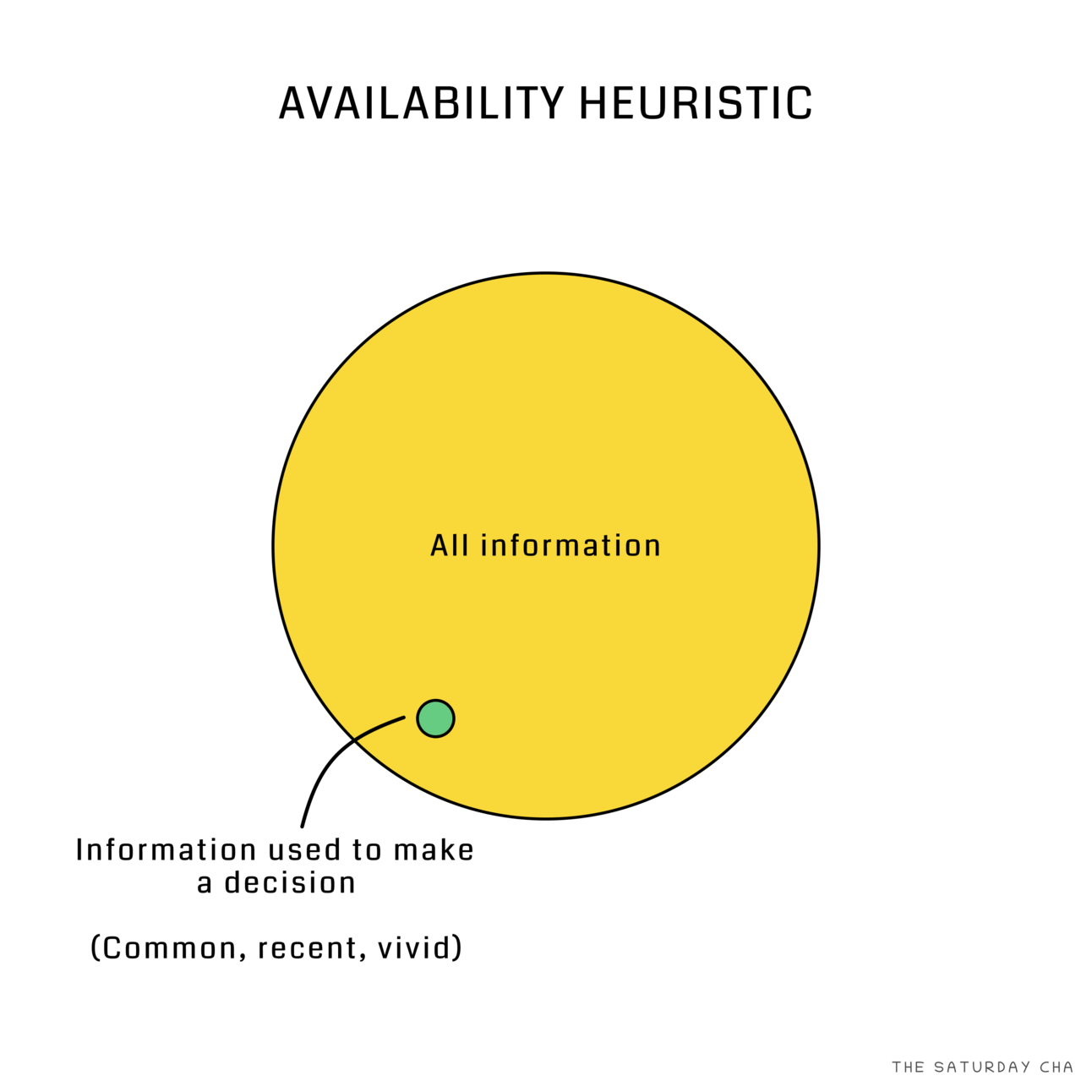
Have you encountered these scenarios:
You hear about a rare shark attack on the news. When your friends make plans of going swimming, you decline, citing this news.
You only read about wars and crimes on the news. You assume that the world is a terrible place and stop travelling anywhere.
You read about divorce among celebrities. You start assuming that all celebrities get divorced.
These are examples of the availability heuristic. It is a mistake our brain makes by assuming that examples which come to mind easily are the most important and probable ones.
Our brain doesn’t like to be strained, so it takes a short cut by mistaking ease of recall with probability. Generally this information / memories are:
Something you see / read commonly about.
Something which happened recently.
Something you remember vividly.
But why should you know about this?
Better decisions.
Availability heuristic can lead you to make incorrect decisions. For simple matters, it may not be a problem. But, when major decisions are made this way, it can have disastrous consequences. So by learning about this bias, we get better at decision making.
Uncovering blind - spots.
e.g. as a child you may have remembered a painful visit to the dentist. Because of this you stopped going to the dentist. And by default, ignoring dental health. But when your teeth need attention, don’t use this as a reason to ignore it.
Overcome irrational fears.
You read about a plane accident and decided to stop flying. But when you check the statistics, flying is safer than driving. So, instead of crippling ourselves with irrational fears, it’s better to understand what’s causing them.
Be a better thinker.
Our thinking shapes our decisions and hence, life. By learning about the most - common biases, we become a little bit smarter. We avoid forming stereotypes.
People tend to assess the relative importance of issues by the ease with which they are retrieved from memory—and this is largely determined by the extent of coverage in the media.
How to use this in your daily life:
Question your assumptions.
The next time you decide on a major decision quickly:
STOP
Ask yourself: “Is this a reversible decision or an irreversible decision?”. A reversible decision is like a two - way door. Even if you change your mind later, the damage will be less. e.g. deciding to buy a new phone.
An irreversible decision is like a one - way door. You can change your mind later, but at a huge cost. e.g. deciding to buy a house.
If it is an irreversible decision, slow down. You’ll be much better off when you systematically analyze your assumptions. Some of these may be biases, such as the availability heuristic.
Seek diverse information.
In this old interview, the interviewer asks Elon Musk, “What is the one piece of advice that you would always recommend to an entrepreneur“?
Elon Musk gives a surprising answer :
It is very important to actively seek out and listen very carefully to negative feedback
He makes a super - important point here. When you look at both sides of the argument, you understand what you’re missing. This will help you slow down and make a better decision.
Look at the numbers.
Maybe someone said to you, “hey, man, this government sucks. All they do is drama, day in and day out“. Now, voting day is getting close. Don’t get swayed by sentiment. Look at how the government has performed. Has GDP increased? Is Unemployment less? Is your political representative educated & reasonable? Study these and take a call.
Fact - check.
These days, Whatsapp has become it’s own university. Anyone can “create” whatever “news” suits his agenda. You might recall how Whatsapp limited the number of times a message can be forwarded. This was to curb the viral spread of disinformation which led to mobs.
Consuming news from social media platforms is like pouring fuel over fire. Stick to trusted sources of high - quality, independent journalism.
Remember, just because something comes to mind easily, does not mean it is statistically probable. Thinking clearly is hard. But it is worth it.
I hope this concept helps you take better decisions in the future. If you found this helpful, share with someone who will benefit.

